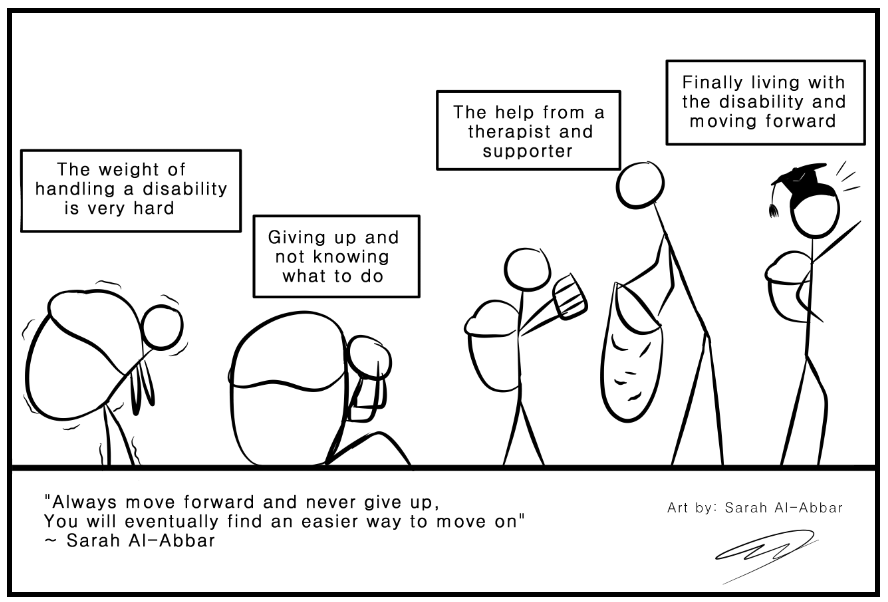
My Experience as a Dyslexic Speech Therapist
By Sarah Al-Abbar
Introduction:
Have you even been scolded about not doing a good job, even though you worked so hard on it? Well, that’s how I usually feel. I never liked talking about having a disability since others look down on me. It took me 25 years to finally gain the confidence to speak about it. I am proud that I, Sarah Al-Abbar, an individual with Dyslexia, graduated from Kuwait University with a Bachelor of Science degree in Communication Disorders.
My Dyslexia:
I was diagnosed in the seventh grade (aged 11 years) with a reading disability. I had a hard time studying, I was getting bad grades, and I had difficulties producing/understanding spoken and written language. I was labelled a slow learner with weak listening and cognitive skills and speech disfluencies. I had particular issues with the Arabic diacritics [ـِــُــَ], as I stutter and take long pauses while reading them in sentences. I also switched sounds and letters while reading and writing and pronounced everything incorrectly. Moreover, to add to my learning difficulties, I also had anxiety. I had no friends, and I was always alone. Because of this, my mother kept my disability a secret from me during my school years, and I had no idea until I entered University.
Looking back, there was a positive side to my dyslexia. Since the left hemisphere is what is affected with my Dyslexia, I was able to make use of the right side of my brain more which involves creativity. I love arts and crafts, and I tended to use my hands more than my words.
College Years:
I did not think about Dyslexia as much in my first years in University since I thought it was not important. After getting low grades, however, I began to panic! “Why is this happening? I studied well!” Soon after, my mother reminded me about my disability. Thus, the stages of grief started:
- Denial: “I can’t believe that I have Dyslexia.”
- Anger: “It was my fault I didn’t study well.”
- Bargaining: “Maybe my Dyslexia is mild.”
- Depression: “THAT’S IT! I can’t do it, it’s impossible!”
- Acceptance: “It’s fine; I’m doing well so far”.
Studying as a University student is not as easy as I thought (since I never knew how to study as a child); my procedure while trying to study was:
- Bring a notebook to class.
- Write down what the instructor said.
- Write down my thoughts and explain them.
- Write down the notes on the slides or the books content and instructor’s thoughts as well as my own.
- Write the notes again in a tidier and organized way once I returned home.
It took me going through all of those steps to finally understand! With endless nights of studying, I still got bad grades. I was frequently jealous of my colleagues for reading and understanding with no effort and yet, getting higher grades than me. So, being a perfectionist made me think, “I am finally at an equal level as my peers”, which meant that I worked harder than everyone else.
Nevertheless, I never gave up and kept moving forward. I always asked questions during classes, I might have annoyed my instructors and classmates, but I kept on asking. Questions like: “What if?”, “Meaning and examples?”, “Real life experiences?”, “Why?”, and “What is the purpose of that method?” The more I asked, the more I loved my major. I appreciated some of my teachers for understanding me and still treated me equally with my colleagues, I hate being treated differently.
As a Speech Therapist:
I started having thoughts like “I can’t do it” and “I have a learning disability, I barely know the basic language and grammar in Arabic, why am I treating others about something I don’t know myself?” I still have those thoughts but I have not given up. I am looking at every direction on how to learn these skills because I love to learn new things, it’s what keeps me going. The more I learn about speech and language, the more it helps me improve my own disability.
Conclusion:
In conclusion, remember whether you have a disability or not, never give up! I went through a lot of hardships and I succeeded. I kept pushing myself forward even though I never believed in myself. With supportive colleagues and instructors, I was able to improve. Never! I repeat, NEVER give up! I always thought, “you came so far for a reason, remember that reason and keep moving forward.” There is always someone who supports you to achieve your dreams, go and make that person proud and show them that you can do it. My Dyslexia did not stop me, it slowed me down, and I still came out on top.
-------------
Sara Al-Abbar graduated with a B.Sc. degree in communication disorders from Kuwait University. She works as a Speech Language Pathologist at the Physical Medicine and Rehabilitation Hospital in Kuwait.
Leave a comment